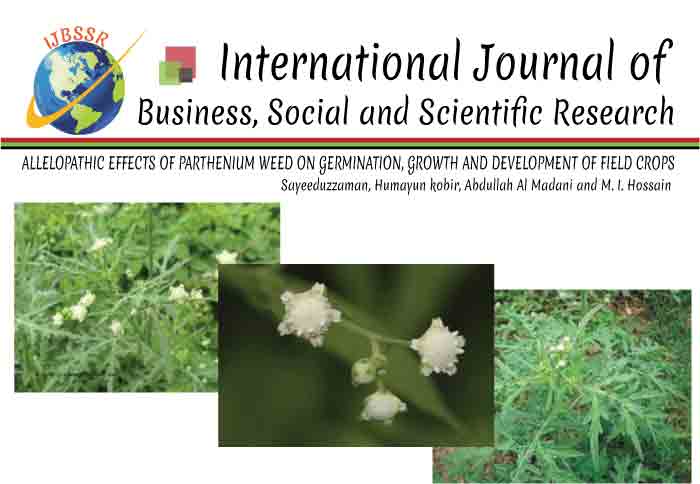ALLELOPATHIC EFFECTS OF PARTHENIUM WEED ON GERMINATION, GROWTH AND DEVELOPMENT OF FIELD CROPS

Aqueous extracts of shoot included branch and
leaves of Parthenium hysterophorus L. at 5, 3.75, 2.5 and 0 (w/v)
concentrations were applied to evaluate their allelopathic on seed germination
and seedling growth of four field crops namely, rice, wheat, chickpea and
mustard under laboratory condition at Agronomy Seed Lab, Bangladesh Agricultural
University (BAU), Mymensingh during the month of February to April 2020. The
differences in response among the field crops, the effects of different
concentration of the extract were noted. Average Percent Inhibition (API) (%
reduction in seed germination + % reduction in shoot length + % reduction root
length + % reduction in seedling dry weight)/4) in the test crops due to
allelopathic effects of the weed was calculated. Results revealed that rice was
mostly affected (API= 47.3) followed by chickpea (API= 35.7) and wheat (API=
26.3) while it was marked lowest (API= 22.5) in mustard due to allelopathic
effects of Parthenium extracts. Seed germination was reduced by 59.2%,
34.9%, 36.7%, 35.3%, dry matter was reduced by 42.5%, 14.8%, 17.9%, 44.5%, shoot
length was reduced by 48.4%, 20.1%, 55.2%, 4.2% and root length was reduced by
39.2%, 35.4%, 33.2%, 6.1% in rice, wheat, chickpea and mustard, respectively.
The inhibitory effects of Parthenium extracts were increased
progressively with the increase in extract concentration. A 5% extract of Parthenium
weed is enough to reduce the growth of field crops by about 50%.

